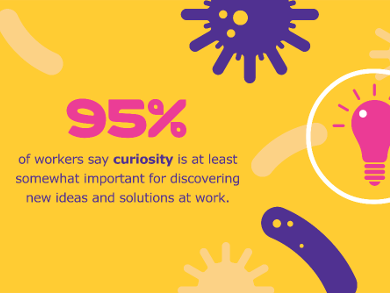Merck conducted the first global curiosity study among workers from Germany, the United States, and China – three countries characterized by different cultures and economic systems. The study examines the curiosity index of workers in four dimensions to compare curiosity levels at work in an international context.
According to the study, 85 % think that a curios person is more likely to bring an idea to life at work. Even though curiosity plays an important role on the job, the majority of study participants did not describe themselves as curious. Staff instead described themselves as organized, collaborative, and detail-oriented. “Curious” came only in twelfth place. The survey results also show that many employees feel that curiosity is usually not as appreciated in their daily work as other qualities. 73% of respondents, e.g., do not feel comfortable asking more questions at work.
“Innovation and technological progress do not appear out of the blue. They always develop out of a person’s sense of curiosity about something new. Scientific curiosity and the joy of discovery are thus our most important resources when it comes to finding answers to global challenges such as the aging of our society or population growth,” said Stefan Oschmann, Chairman of the Executive Board and CEO of Merck. “That’s why curiosity should be a key aspect of our everyday work.”
To define the concept of curiosity, and to make it measurable, Merck has worked closely with curiosity expert Todd Kashdan, George Mason University, USA. Together, they came up with four dimensions of curiosity: Inquisitiveness, creativity, openness, and distress tolerance. For the study, Merck conducted more than 3,000 online surveys with full-time employees in Germany, the United States, and China. Focus group interviews were also carried out.
On the interactive online platform at curiosity.merckgroup.com, visitors can take a self-test to find out how curious they are. There are also tips for overcoming creative blocks and articles on the subject of curiosity.
- Merck KGaA, Darmstadt, Germany




